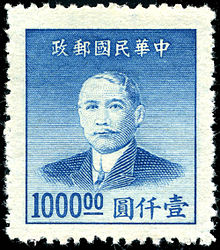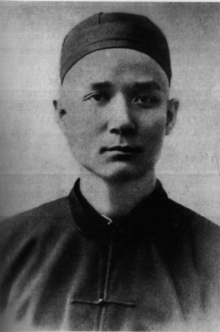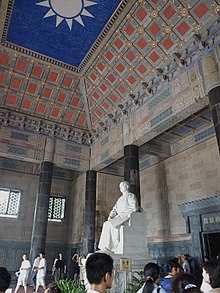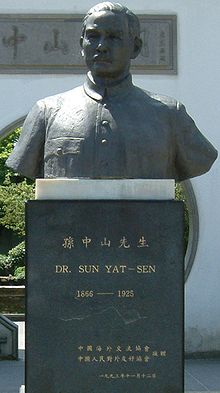Sun Yat-sen
Sun Yat-sen, also Sun Jat-sen (Chinese 孫逸仙 / 孙逸仙, pinyin Sūn Yìxiān, in China usually 孫中山 / 孙中山, Sūn Zhōngshān; * 12. November 1866, in Cuiheng Village near Zhongshan, Guangdong Province, Imperial China; † March 12, 1925 in Beijing, Republic of China) was a Chinese revolutionary and statesman. He founded the Tongmenghui League, which later became the Kuomintang (KMT), in Japanese exile in Tokyo, and on January 1, 1912 became the first provisional president of the Republic of China, which ended the more than two-thousand-year-old Empire. After several years in exile, he became president of the self-proclaimed national government in Canton (Guangzhou) in 1921.
Sun played a crucial role in the overthrow of the Qing government, including the Xinhai Revolution. He controlled the overthrow of the government from abroad at this time.
Sun Yat-sen, as the founder of modern China, is revered both in the Republic of China on Taiwan, which continues to exist on Taiwanese soil, and in the People's Republic of China. His political philosophy is known as the "Three Principles of the People". His wife Song Qingling, who long survived him, played an important role in both pre-World War II China and the People's Republic, and later served as President of the People's Republic.
In the Chinese-speaking world, Sun is usually called Sūn Zhōngshān (孫中山 / 孙中山) in public Chinese. This more popular name in pinyin, the official transliteration of the People's Republic of China, is composed of the Chinese surname "Sun" (孫 / 孙) and the call name "Nakayama" (Jap. 中山, kana なかやま) or "Chuuzan" (中山, ちゅうざん), Sun's first pseudonym in Japanese exile, after the High Chinese pronunciation "Zhongshan". In China-both mainland China and Taiwan-Sun is honored with the title (Lord) Father of the Country Sun Zhongshan (國父孫中山先生 / 国父孙中山先生, Guófù Sūn Zhōngshān xiānshēng, Kuo-fu Sun Chung-shan hsien-sheng).
Name details
Sun's official name at birth is Sūn Wén (孫文 / 孙文, Sun Wen). As was traditionally the case during the imperial period, Chinese had other additional names besides their birth names, which were given to them at birth by their parents and later on when they came of age or were educated (cf. pen name or pseudonym for authors or the like), especially in educated families.
| Transcription | Birth name | Míng1 | Pǔmíng2 | Zì3 | Hào4 | Hào4 | Rǔmíng5 | Pseudonym6 | Pseudonym6 |
| Chinese | 孫文a | 文 | 德明 | 載之b | 逸仙 | 日新 | 帝象 | 中山樵 | 高野長雄c |
| Pinyin | Sūn Wén | Wén | Démíng | Zàizhī | Yìxiān | Rìxīn | Dìxiàng | Zhōngshān Qiáo | Gāoyě Chángxióng |
| W.G.. | Sun Wen | Wen | Te-ming | Tsai-chih | I-hsien | Jih-hsin | Ti-hsiang | Chungshan chiao | Kaoyeh Changhsiung |
| Jyutping | Syun1 Man4 | Man4 | Dak1ming4 | Zoi3zi1 | Jat6sin1 | Jat6san1 | Dai3zoeng6 | Zung1saan1 Ciu4 | Gou1je5 Coeng4hung4 |
| Japanese | 孫文 | 文 | 德明 | 載之 | 逸仙 | 日新 | 帝象 | 中山樵 | |
| Hepburn | Son Bun | Bun | Tomei | Saishi | Issen | Nisshin | Teishou | Nakayama Kikori | Takano Nagao |
Note
All characters in the above table in long characters
1 Míng 名, official first name at birth
2 Pǔmíng 譜名 / 谱名, name in the family book of the family clan.
3 Zì 字, name of great age, name of full age
4 Hào 號 / 号, honorific name
5 Rǔmíng 乳名, milk name, family pet name in childhood.
6 Huàmíng 化名, pseudonym, alias
a Sūn Wén - 孙文 in shorthand
b Zàizhī - 载之 in short characters
c Takano Nagao - 高野长雄 in shorthand
Live
Youth
Sun Yat-sen was born on November 12, 1866, to a peasant family in Cuiheng Village (翠亨村), Xiangshan County (香山縣 / 香山县), Guangdong (South China). The district was renamed Zhongshan in his honor. About his background, Sun said, "I am a coolie and the son of a coolie. I have always sympathized with the people's struggle."
According to a birth certificate issued by the Hawaiian Territory of the United States, he was born in the Kingdom of Hawaiʻi on November 24, 1870. This information is believed to be inaccurate. Sun Yat-sen obtained this birth certificate in March 1904 while in Hawaii. It enabled him to legally reside in the United States, which would have otherwise been denied to him due to the Chinese Exclusion Act of 1882.
In 1878, at the age of 13, he went to Hawaii for the first time and moved to Honolulu to live with his brother, who had already started there as a laborer and had become rich as a merchant. From 1879 to 1882 he studied at the Anglican Iolani School, until 1883 still at the Punahou School. This first contact with Christianity shaped him deeply.
After returning to the village of Cuiheng, he smashed a statue of the gods in the village temple to demonstrate his rebellion against the prevailing circumstances. For this he was banished from the village.
Christian baptism
In the early 1880s, his sister Sun Mei sent him to the Lolani School, which was under the direction of the British Anglican Church and led by the prelate Alfred Willis. Classes were conducted in English. Although Bishop Willis emphasized that no one would be forced to adopt the Christian faith, Sunday chapel attendance was compulsory for the students. It was in this school that Sun Yat-sen first came into contact with Christianity, which left a deep impression on him. Harold Schiffrin wrote that the Christian faith had a great influence on Sun's future political course.
Sun was later baptized in Hong Kong by an American missionary of the Congregational Church of the USA. His brother, however, disregarded this baptism.
His conversion to the Christian faith was linked to his revolutionary ideals, and also encouraged by them.
Revolutionary activity
Sun began studying medicine in 1887 at the Hong Kong College of Medicine for Chinese, which later became the University of Hong Kong, where he was one of the first two graduates in 1892. He then worked as a doctor at Kiang Wu Hospital in Macau. In medicine, Sun Yat-sen, guided by the Japanese example, pursued a radical renewal in his further life as well as the filling of Chinese chairs with German professors.
His sojourns in the West reinforced in him dissatisfaction with the Qing Dynasty government, and so he began his political activities by organizing reform groups of exiled Chinese in Hong Kong. In October 1894, he founded the Xingzhonghui (興中會 / 兴中会 - "Association for the Restoration of China") with the aim of creating a platform for future revolutionary activities.
In 1895, the "Canton Uprising" (乙未廣州起義 / 乙未广州起义) he helped plan failed. The Qing government put a bounty on his head, and Sun went into exile in Europe, the US, Canada and Japan for 16 years. There he raised money for his revolutionary activities. In Japan, he joined Chinese dissident groups and founded the Tongmenghui League (roughly "Chinese Revolutionary League") there in 1905, the predecessor of the Kuomintang. He was expelled from Japan to the USA for this. During this time, he also began to wear Western suits and had his Chinese braid cut off.
On October 10, 1911, the Wuchang Uprising began, kicking off the Xinhai Revolution and leading to the end of two thousand years of imperial dynasty rule in China. Sun heard of the military's successful rebellion against the Qing dynasty. As a result, he first went to Europe to convince the Western powers there to stop granting loans to the Qing. In London, he thus scored an important success. He returned to China from France at Christmas.
Presidency in the new republic
On December 29, 1911, Sun was elected interim president of the Republic of China at a conference of provincial representatives in Nanjing.
Although Kuomintang historiography places much emphasis on Sun's role, many historians doubt that he played much of a role in the 1911 coup, simply because he was abroad at the time. Rather, he was elected interim president because he was respected but insignificant and represented a compromise candidate between revolutionaries and the conservative aristocracy. On August 12, 1912, in anticipation of the upcoming parliamentary elections, he formed the National People's Party (Kuomintang) from numerous smaller political groups.
After his swearing-in, Sun convened delegates from all the provinces to form the National Assembly of the Republic of China. The Transitional Law was declared by this assembly to be the basic law of the new republic.
The interim government was nevertheless in a very weak position: the southern provinces had declared independence, while the north had not yet done so. The interim government also had no armed forces, as its control over the new army was tenuous and there were many troops still loyal to the Qing. Therefore, Sun needed the support of Yuan Shikai, who had the Beiyang Army, the military of northern China, under his command. Sun was forced to promise him the presidency so that he would side with the revolution and force Emperor Puyi to abdicate.
When Yuan became a dictator, Sun tried to launch a revolt against him in 1913. When it failed, Sun went into exile in Japan, where he reorganized the Kuomintang.
There he married Song Qingling on October 25, after separating from his first wife Lu Muzhen.
In 1917 he returned to China and in 1921 was elected president of the self-proclaimed national government in Canton. In 1923, he gave a speech declaring his Three People's Principles as the basis of the state and his Five Yuan Constitution as the guideline for the political system.
In order to have military clout for a northern expedition against the militarists in Peking, he founded the Whampoa Military Academy near Canton, with Chiang Kai-shek as commander and Party comrades like Wang Jingwei and Hu Hanmin as political instructors.
In the early 1920s, Sun got help from the Comintern to reorganize the Kuomintang into a Leninist party. At the same time, he negotiated the first united front of Communists and Kuomintang. In 1924, this alliance was further strengthened in order to better control the country. At this point, Sun was convinced that China could only be unified by force from its base in southern China. After a period of political tutelage, a transition to democracy was then to occur.
On November 10, 1924, Sun traveled to the North and advocated an all-China conference and the abolition of unfair trade treaties with the West. Two days later, despite poor health and civil war, he traveled again to the North to discuss the future of the country.
On March 12, 1925, he died of liver cancer in Beijing at the age of 58.

Portrait on a stamp, Taiwan 1949

Seventeen-year-old Sun Wen (Sun Yat-sen) in typical clothing of the Qing period

Sun Yat-sen Mausoleum in Nanking, PR China, with the flag of the Kuomintang on the ceiling

Bust in front of the Chinese Garden in Vancouver, Canada
Search within the encyclopedia